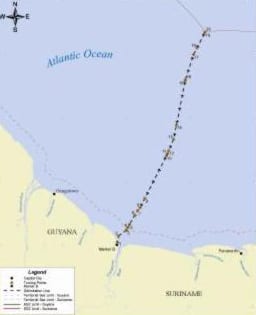It was disclosed by Guyana’s Minister of Foreign Affairs, Carl Greenidge, on Thursday that the Government has spent US$3.7M in 2018 to fight Guyana’s border case at the International Court of Justice (ICJ).
“This business at the ICJ is a very expensive and complicated one,” the Minister said.
Guyana filed an Application against its Spanish-speaking neighbour, Venezuela, in March 2018 to settle the century-old dispute over the Essequibo region by declaring the validity of the 1899 Arbitral award. The move followed the United Nations’ Secretary General’s decision for a judicial settlement after both countries failed to settle the matter through the UN Good Offices process in 2017.
The monies for the legal fees are being taken from the US$18M signing bonus received from ExxonMobil in 2016 of which US$15M (GYD$3,135,975,000) was set aside for same.
Responding to questions of whether the sum set aside is too much, Minister Greenidge said winning the case is important to secure the benefits of the booming oil and gas industry.
“That is a once and for all investment in protecting your rights,” he said.
The Minister referred to the Liza Phase 1 project, set to come on stream by 2020, noting that it “will probably generate, at the beginning, by 2021, over US$350M per annum.” This figure is 23 times more than the US$15M set aside for legal fees for the border case.
“If you look at the resources at risk, you will see that this is a very very important issue and it really doesn’t behoove us to be spending too much time arguing about 10 cents extra in order to get the legal skills we need,” he added.
Following the first discovery made by ExxonMobil and its partners; Hess Guyana Exploration Ltd. and CNOOC Nexen Petroleum Guyana Limited in 2015, the Venezuelan government expanded its claim to Guyana’s territory to include Atlantic waters off the Essequibo coast which encompass a large part of the Stabroek Block where more than 5 billion barrels of recoverable oil have so far been found.
Minister Greenidge compared the Guyana/Venezuela dispute with the now settled border dispute with Suriname.

“If for example we had lost the Suriname case which the PPP say cost around US$10M…if Suriname had prevailed…all of Liza 1 would have been Suriname’s property. Unlike the Guyanese, Suriname would have been celebrating even now and not trying to commit suicide,” he noted.
The team of Lawyers fighting the ICJ case has not yet been disclosed but the Government said it has retained lawyers who fought the Suriname border case among others.
It is a “core team” of Lawyers the Minister said but cannot say whether the team will have to be increased.
He contended that that will depend on Venezuela’s response to the case which it has up to April 2019 to submit, and the ICJ’s requirement going forward.
“Normally what they seem to do is to supplement them on a particular topic, on a particular angle where they can find a specialist coming in to supplement the capacity that they have,” he said.
Following the submission of the application against Venezuela in March, that country refused to participate in the process and decided to challenge the authority of the court to rule on the matter.
Last month, the Guyana Government submitted to the ICJ its Memorial detailing why the court has jurisdiction in the case and Venezuela was given up to April 2019 to do so.
Guyana’s foreign Minister said the average length of time taken to resolve a disputed case is six years.
However, he noted that whether the Spanish speaking nation participates in the case or not, it will have to abide by the Court’s decision or the breaches will be dealt with by the Security Council or the United Nations General Assembly.



